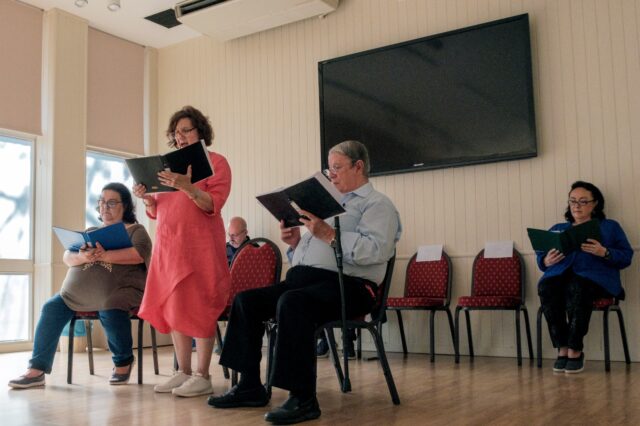The greatest hits in British poetry tomorrow evening
What do the following phrases have in common: “Far from the madding crowd”, “They also serve who also stand and wait”, “the paths of glory” and “kindred spirit”? And in what context were they originally said? The answer is to be found tomorrow at 7.30 pm at the Charles Hunt room at the John Mackintosh Hall.
They are all phrases coined by some of the great British poets and feature in the latest Group 2000 production, The Greatest Hits in Poetry (Part 1).
“The mastermind behind this poetry reading is Cecil Gomez, the doyen of Gibraltar theatre. He has assembled a seasoned team who elegantly, gracefully, passionately and humorously read the poems that he has chosen as the all-time Greatest Hits,” a spokesman for the event said.
“They are Carmen Gomez, Araceli Latin, Maite Gracia, Alfred Reoch, Richard Garcia and Nicky Guerrero. As usual, Cecil will introduce each of the pieces, in his inimitable way.”




“The whirlwind tour through some of the finest poetry written in English starts with Chaucer and ends with Gray, with doses in between of Shakespeare, Ben Jonson, Milton and Swift (perhaps best known as the author of Gulliver’s Travels).”
“It is a light-hearted journey through 400 years of British poetry, and one that is designed to enchant and delight. The comic verse shows that our forefathers had a great sense of humour. The more serious verse speaks of love and the complexities of life, in a truly memorable way.”
The programme is just under an hour in length. Admission is free, but there will be a retiring collection in aid of Research into Childhood Cancer.
Mr Gomez said he decided to renew activities which are now mainly recitals or presentations after the Covid-19 pandemic.
“These I now limit to 50 minutes without an interval and will be presenting the present one at the Charles Hunt Room at the John Mackintosh Hall,” he said.
“I have called it ‘The Greatest Hits In Poetry- Part One- ‘1343 to 1750’. Each poem usually has a line or phrase that many can remember but not from what poem. Others will bring to mind poems they learnt in school.”
“The period involved will start with an extract from Chaucer’s Prologue to his ‘Canterbury Tales’. This will be read in -Middle English- the language of the common people at the time and then followed by a translation in the language of today.”
“Via Sir Philip Sidney and Christopher Marlow we will come to Shakespeare and two of his sonnets.”
“The Metaphysical Poets will be represented by Marvell, Herbert, Vaughan and John Donne. The latter’s ‘The Flea’ is an example of how bold and almost explicit such poets on the matter of sex were. Also, we shall give voice to Marvell’s ‘To His Coy Mistress’ in the same vein.”
“In their midst comes Milton and his sonnet on ‘blindness’ plus a short extract from ‘Paradise Lost’. “
“Bunyan’s poem comes next with his ‘Who Would True Valour Sing’, a poem later set to music and now a popular hymn.”




“Who has not heard or read ‘Gulliver’s Travels’ by Jonathan Swift, meant as a satirical novel though loved by the young in a children’s version? What a contrast then the extracts from his ‘A Beautiful Young Nymph Going to Bed’ and her waking up.”
“Another satire follows: ‘The Rape of the Lock’ by Alexander Pope. Henry Carey was another satirist whose most famous poem was the lovely: ‘Sally in our Alley’. Sally is a diminutive of Sarah, his wife’s name.”
“The recital will end with the Thomas Gray’s masterpiece, ‘Elegy Written in a Country Churchyard’.”












